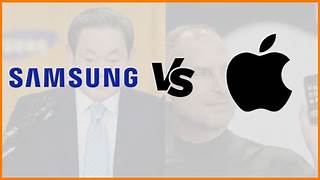Apple vs. Samsung: Which Company is the True Technology Giant?
Introduction
In the world of consumer technology, two names dominate the landscape: Apple and Samsung. These two industry titans have been engaged in a fierce rivalry for decades, each competing to be the leading innovator in smartphones, tablets, wearables, and other tech products. Apple, known for its premium branding and closed ecosystem, is synonymous with sleek designs and high-quality user experience. Samsung, on the other hand, is a powerhouse in hardware innovation, display technology, and versatility.
But which company is truly the technology giant? To answer this, we will analyze various aspects of their market performance, product innovation, brand influence, financial success, and consumer loyalty.
1. Market Performance and Global Reach
Both Apple and Samsung are dominant players in the global tech industry, but their market approaches are different.
Apple’s Market Strategy
- Apple focuses on the premium segment, offering high-end devices with tight integration between hardware and software.
- The company has a strong presence in North America, Europe, and China, where consumers prefer high-end smartphones like the iPhone.
- Apple’s product lineup is relatively small but highly curated, allowing for better control over quality and user experience.
Samsung’s Market Strategy
- Samsung caters to a wider audience, producing devices that range from budget-friendly models to premium flagships.
- The company has a strong presence in emerging markets like India and Southeast Asia, where affordability is a key factor.
- Samsung’s diverse lineup includes foldable phones, tablets, smartwatches, and home appliances, making it a more versatile tech company.
Market Share Comparison
- As of recent years, Samsung often leads in global smartphone shipments, thanks to its large selection of models at different price points.
- Apple, however, dominates in profitability and premium smartphone sales, with iPhones capturing a significant share of the high-end market.
2. Innovation and Technology Leadership
Both companies are pioneers in innovation, continuously pushing the boundaries of technology.
Apple’s Innovation
- Apple revolutionized the smartphone industry with the launch of the iPhone in 2007, introducing the touchscreen experience.
- It pioneered Face ID, Apple Pay, and seamless ecosystem integration across its devices.
- The company has developed custom M-series chips for Macs, significantly improving performance and efficiency.
- Apple’s focus on privacy and security sets it apart, with strong encryption and data protection policies.
Samsung’s Innovation
- Samsung leads in display technology, being the first to introduce AMOLED and foldable screens.
- The company pioneered S Pen technology, bringing stylus functionality to smartphones and tablets.
- Samsung’s Exynos chips and advanced camera sensors compete with Apple’s hardware innovations.
- The company invests heavily in 5G technology and AI-driven smart home solutions.
While Apple excels in software-hardware integration, Samsung is a leader in hardware design and experimentation.
3. Brand Influence and Consumer Loyalty
Both companies have built strong global brands, but their approaches are vastly different.
Apple’s Brand Power
- Apple’s brand is associated with luxury, exclusivity, and simplicity.
- The company has an extremely loyal customer base, with many users sticking to iPhones, MacBooks, and iPads.
- The Apple ecosystem (iOS, macOS, iCloud, Apple Music) encourages users to stay within its platform.
- Apple Stores worldwide offer a premium shopping experience, reinforcing brand loyalty.
Samsung’s Brand Power
- Samsung has a more diverse branding strategy, targeting a wide range of consumers from budget users to premium buyers.
- It is a leader in advertising and sponsorships, partnering with global sports events and influencers.
- Samsung’s flexible product ecosystem (Android, SmartThings, Windows integration) provides more customization options.
Apple has higher brand loyalty, but Samsung’s global recognition and product diversity make it a household name in multiple industries.
4. Financial Success and Revenue Growth
Both companies generate billions in revenue, but their income sources differ.
Apple’s Financial Strength
- Apple earns most of its revenue from iPhone sales, which contribute over 50% of its total income.
- The company has successfully built a services business (Apple Music, iCloud, Apple Pay, App Store) that generates recurring revenue.
- Apple maintains high profit margins due to its premium pricing strategy and efficient supply chain.
Samsung’s Financial Strength
- Samsung’s revenue comes from multiple sectors, including smartphones, semiconductors, TVs, home appliances, and displays.
- It is the largest supplier of OLED displays, providing screens for Apple, Google, and other brands.
- Samsung’s semiconductor business is one of the largest in the world, supplying chips for major tech companies.
Apple has higher profit margins, while Samsung’s diversified revenue streams provide long-term stability.
5. Software and User Experience
The software experience is a key differentiator between the two companies.
Apple’s iOS and macOS
- Closed ecosystem: Apple’s software is optimized for its hardware, ensuring a smooth experience.
- Seamless integration: iPhones, iPads, MacBooks, and Apple Watches work flawlessly together.
- Long-term software updates: Apple supports devices with updates for 5+ years, keeping them secure and functional.
- Privacy focus: Apple is strict about user data protection and app tracking restrictions.
Samsung’s Android and One UI
- Customizable UI: Samsung’s One UI offers more flexibility and personalization than iOS.
- Wider compatibility: Samsung devices integrate with Windows, Google services, and a variety of apps.
- Faster hardware innovation: Features like foldable phones and 8K video recording arrive earlier than on Apple devices.
- Software update improvements: Samsung now provides 4 years of major Android updates, closing the gap with Apple.
While Apple provides a more seamless and secure experience, Samsung’s flexibility and customization appeal to a broader audience.
Conclusion: Who is the True Technology Giant?
Both Apple and Samsung are undisputed technology giants, but their strengths lie in different areas:
- Apple is the leader in premium products, software optimization, ecosystem integration, and profit margins.
- Samsung dominates in hardware innovation, global reach, product diversity, and display technology.
If we define a technology giant by innovation and market influence, Samsung leads with its advancements in foldable phones, chip manufacturing, and display technology.
If we define it by brand power, profitability, and customer loyalty, Apple is the clear winner, thanks to its premium ecosystem and high-margin business model.
Ultimately, both companies are powerhouses shaping the future of technology, and their ongoing competition benefits consumers by driving innovation and pushing the boundaries of what’s possible in the tech world.


